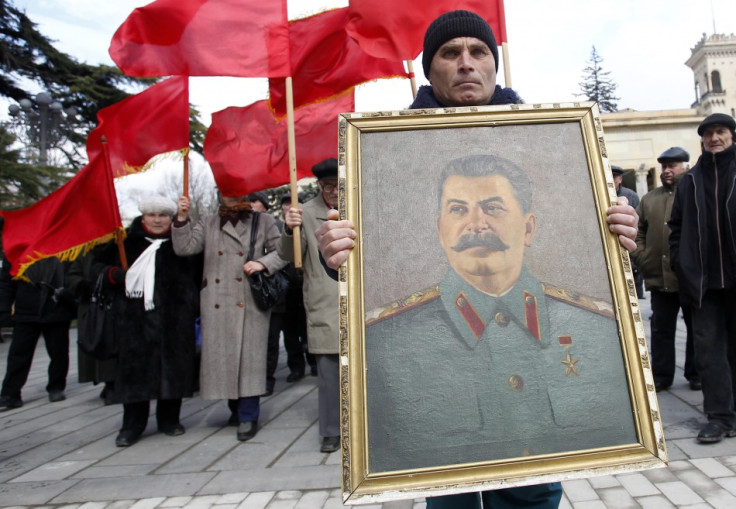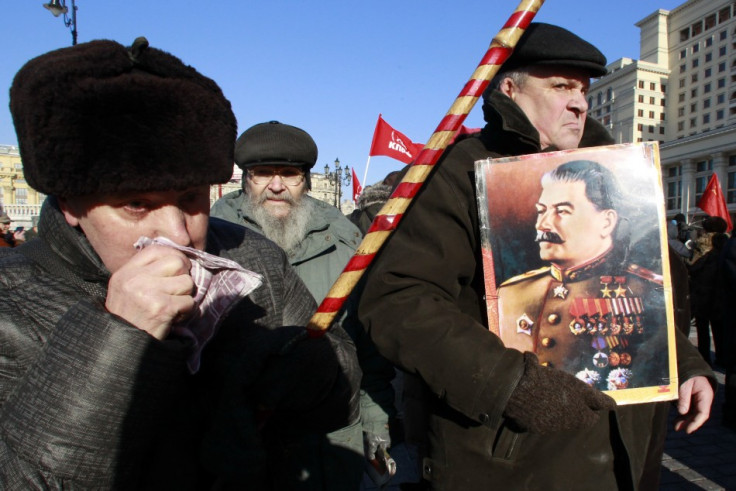Joseph Stalin: Russians Mark 60th Anniversary of Death of Soviet Union's Divisive Dictator
Hero or monster? Uncle Joe Stalin's legacy still flounders between admiration and contempt

Russians have marked the 60th anniversary of the death of Joseph Stalin, the dictator who led the Soviet Union from 1924-1953 and whose government stands accused of deliberately killing six million civilians in the gulag network of labour camps.
Support for Stalin has increased in Russia since the collapse of the Soviet Union in 1991. Polls show that nearly 50 percent of Russians regard his role in the country's history as positive.
About 1,000 supporters of the late Georgia-born dictator, led by Communist party chief Gennady Zyuganov, laid flowers at his tomb by the Kremlin wall and praised him as a symbol of the nation's great victories.
"Industrialisation, victory in the Great Patriotic War [the war against Nazi Germany], the discovery of the atom, the development of nuclear technology, the [first] space flight, along with the glory of the great power, USSR, will remain in people's memory forever," Zyuganov wrote in Pravda, his party's newspaper, in 2009.
"They are inextricably linked to the name of Stalin, a revolutionary and a patriot of Russia."
Even the Russian Orthodox Church, which was persecuted by the Soviet dictator, was full of good words for him.
"Stalin was no saint, but he was not a monster," said Russian Orthodox priest Alexander Shumsky. He accused Stalin's critics of exaggerating the scale of his crimes.
Analysts said that Russia's President Vladimir Putin was behind the new wave of praise for Stalin.
"Putin has deliberately manipulated the dictator's image to reinforce his effort to build a 'power vertical' in Russia," the Carnegie Endowment for International Peace thinktank said.
The Great Terror
Putin launched a programme to "ideologically re-educate society" when he was elected in 2000, according to Lev Gudkov, director of Independent Levada Center.
School history textbooks have been publish that stress Stalin's role as an "effective manager" of the 1930s Soviet industrialisation campaign. Putin has never praised Stalin publicly and paid tribute to Stalin victims at the site of mass grave in 2007 but he also said that Russia should not feel guilty about the Great Terror widespread repression of dissidents in 1937.
Putin's protege, Dmitry Medvedev, the Russian prime minister has never concealed his hatred for Stalin. In 2010 he said that the dictator "committed many crimes against his people".
A poll, conducted by Levada last autumn, found that 47 percent of Russians said that Stalin was "a wise leader who brought the Soviet Union to might and prosperity".
In February, 49 percent of people told Levada that Stalin played a positive role in Russian history.
However, two-thirds of respondents said that Stalin was "a cruel, inhuman tyrant, responsible for the deaths of millions of innocent people".
Pro-Kremlin MPs campaigned to rename the city of Volgograd as Stalingrad, its name from 1925-61. But opposition politicians have slammed the government for failing to condemn Stalin's repressions. A large number of Russians believe that the dictator had mystical powers.
"Russian society is living through a period of crisis of historical consciousness and the only remedy for this ailment is creating an archive describing [the Stalin era]," said Andrei Sorokin, director of the Russian Archive of Socio-Political History.

© Copyright IBTimes 2025. All rights reserved.






















